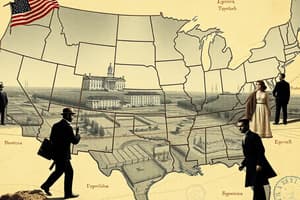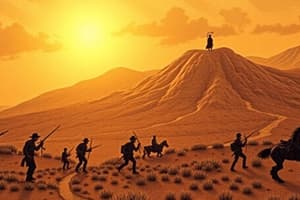Podcast
Questions and Answers
What was the primary reason many Northerners and Southerners supported recolonization?
What was the primary reason many Northerners and Southerners supported recolonization?
- Economic benefits of freed slave labor
- Desire to abolish slavery completely without relocation
- Concern over potential social problems due to free blacks in society (correct)
- A belief in the superiority of the American way of life
Which publication was founded by Frederick Douglass?
Which publication was founded by Frederick Douglass?
- The Liberator
- The North Star (correct)
- The Emancipator
- The Abolitionist Review
What significant action did William Lloyd Garrison take to show his opposition to slavery?
What significant action did William Lloyd Garrison take to show his opposition to slavery?
- Formed the Republican Party
- Established the Underground Railroad
- Created a documentary film
- Burned the Constitution (correct)
What was a common sentiment among the freed blacks regarding relocation to Liberia?
What was a common sentiment among the freed blacks regarding relocation to Liberia?
What was the primary objective of the American Antislavery Society founded in 1833?
What was the primary objective of the American Antislavery Society founded in 1833?
What major product was easy to grow in the off-season in the Southern economy?
What major product was easy to grow in the off-season in the Southern economy?
Which social class in the Antebellum South primarily consisted of wealthy plantation owners?
Which social class in the Antebellum South primarily consisted of wealthy plantation owners?
What was the primary argument made by George Fitzhugh in defense of slavery?
What was the primary argument made by George Fitzhugh in defense of slavery?
Which religious group was among the first to speak out against slavery in America?
Which religious group was among the first to speak out against slavery in America?
What institution attempted to create a practical solution regarding free blacks if slavery was abolished?
What institution attempted to create a practical solution regarding free blacks if slavery was abolished?
In the Southern defense of slavery, which ancient civilization was often referenced to establish the institution as progressive?
In the Southern defense of slavery, which ancient civilization was often referenced to establish the institution as progressive?
What aspect of African American culture included elements like emotional worship and spirituals?
What aspect of African American culture included elements like emotional worship and spirituals?
What misconception did some Southern intellectuals promote about slavery?
What misconception did some Southern intellectuals promote about slavery?
Flashcards
Manifest Destiny
Manifest Destiny
The belief that the United States was destined by God to expand across the North American continent.
Antebellum South
Antebellum South
The period in American history before the Civil War (1861-1865), marked by significant economic and social changes, particularly in the South.
Planters
Planters
The wealthy landowners who owned large plantations and relied heavily on slave labor. Think Gone With The Wind!!
Small Slaveholders
Small Slaveholders
Signup and view all the flashcards
Yeomen Farmers
Yeomen Farmers
Signup and view all the flashcards
The Peculiar Institution
The Peculiar Institution
Signup and view all the flashcards
Defense of Slavery
Defense of Slavery
Signup and view all the flashcards
Black Christianity
Black Christianity
Signup and view all the flashcards
Abolitionist Movement
Abolitionist Movement
Signup and view all the flashcards
The North Star
The North Star
Signup and view all the flashcards
Underground Railroad
Underground Railroad
Signup and view all the flashcards
William Lloyd Garrison
William Lloyd Garrison
Signup and view all the flashcards
Recolonization
Recolonization
Signup and view all the flashcards
Study Notes
Manifest Destiny
- By the 1830s, America grew quickly through purchases and treaties.
- Treaty of Paris (1783): Territory to the Mississippi River.
- Louisiana Purchase (1803): From Mississippi River to Rocky Mountains.
- Convention of 1818: Disputed land along the Canadian border.
- Adams-Onis Treaty (1819): Florida and border territories with Spanish Mexico.
Manifest Destiny Definition
- Belief that it was America's destiny to spread its power and civilization across the entire North American continent.
- This idea gained popularity in the 1840s, around the acquisitions of Texas, Oregon, and California.
Events in Texas
- In 1823, Mexico invited Americans to settle in their northern province.
- Led by Stephen Austin, over 300 families settled, leading to increased American migration.
- Tensions grew between American settlers and the Mexican government over issues like abolishing slavery and requiring immigrants to convert to Catholicism.
- Mexico responded by closing Texas to further immigration.
- Texans (led by Sam Houston) revolted in 1836 and declared the Republic of Texas.
- Sam Houston was elected president of the republic and sought US annexation.
- The US annexation of Texas was delayed due to sectional issues, with Northerners opposing expanding slave territory.
Oregon
- Polk (Democrat) campaigned on support for Manifest Destiny and acquiring Oregon and California.
- Polk's campaign slogan: "Fifty-four forty or fight."
- Polk compromised on Oregon to achieve the presidency.
Mexican-American War (1846-1848)
- Issues:
- Annexation of Texas creating problems between US and Mexico.
- Disagreement over the southern border of Texas (Rio Grande vs. Nueces River).
- Polk's attempt to buy California and New Mexico from Mexico.
- Polk sent troops to the Rio Grande, resulting in a Mexican attack and a war declaration by the US.
- Key Events:
- U.S. victories in California and New Mexico.
- Treaty of Guadalupe Hidalgo (1848):
-Mexico ceded California and New Mexico to the U.S.
- Established the Rio Grande as the border between Mexico and Texas.
Antebellum South
- Economic Power shift from Upper South to Lower South.
- "Cotton is King": Cotton production dominated the Southern economy, providing significant exports.
- Slow industrial development, rudimentary financial systems, and inadequate transportation.
- Plantations were the largest landowners.
- Yeoman farmers: Independent farmers who primarily owned smaller farms and didn't own slaves.
- The South was overwhelmingly agrarian.
The Abolitionist Movement
- Quakers were early advocates for abolishing slavery.
- William Lloyd Garrison, a publisher, began a radical antislavery newspaper.
- Frederick Douglass, an escaped slave, advocated for abolition.
- Harriet Tubman, a key figure in the Underground Railroad.
Political Tensions (1798–1850)
- States' Rights vs. Strong National Government: The debate over power distribution between federal and state governments
- Alien & Sedition Acts: These acts provoked controversy over the federal government's power. Debate regarding the states' rights to nullify federal laws viewed as unconstitutional.
- Tariff Crisis: Disputes over tariffs (import taxes) pitted the North, which wanted higher tariffs due to manufacturing interests, against the South, which favored low tariffs.
- Compromise of 1850 : Attempts to settle disputes over slavery in newly acquired territories by maintaining the balance between free and slave states.
- Kansas-Nebraska Act (1854): The act allowed popular sovereignty in each territory determining the issue of slavery. This led to violent conflicts between pro-slavery and anti-slavery settlers.
- Bleeding Kansas : A period of violence and conflicts over slavery in Kansas
- Dred Scott Decision (1857): The Supreme Court ruled that slaves were not citizens and Congress couldn't prohibit slavery.
- Lincoln's Election (1860): The election of Abraham Lincoln, an opponent of expanding slavery, triggered the secession of several Southern states.
Secession
- Several Southern states seceded from the Union due to concerns over slavery and fearing that Lincoln's presidency would threaten their way of life.
Studying That Suits You
Use AI to generate personalized quizzes and flashcards to suit your learning preferences.




